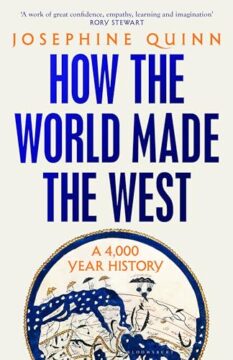Steven Poole at The Guardian:
 “Western civilisation” would not exist without its Islamic, African, Indian and Chinese influences. To understand why, Quinn takes us back in time, beginning at the bustling port of Byblos in Lebanon in about 2000BC. It was the middle of the bronze age, which “inaugurated a new era of regular long-distance exchange”. Carbon dating techniques applied to recent archaeological findings provide compelling evidence about just how “globalized” the Mediterranean already was, 4,000 years ago. Welsh copper went to Scandinavia, and Cornish tin as far as Germany, for the forging of bronze weapons. Beads of Baltic amber, found in the graves of Mycenaean nobles, were made in Britain. A thousand years later, trade up and down the Atlantic seaboard meant that “Irish cauldrons became especially popular in northern Portugal”.
“Western civilisation” would not exist without its Islamic, African, Indian and Chinese influences. To understand why, Quinn takes us back in time, beginning at the bustling port of Byblos in Lebanon in about 2000BC. It was the middle of the bronze age, which “inaugurated a new era of regular long-distance exchange”. Carbon dating techniques applied to recent archaeological findings provide compelling evidence about just how “globalized” the Mediterranean already was, 4,000 years ago. Welsh copper went to Scandinavia, and Cornish tin as far as Germany, for the forging of bronze weapons. Beads of Baltic amber, found in the graves of Mycenaean nobles, were made in Britain. A thousand years later, trade up and down the Atlantic seaboard meant that “Irish cauldrons became especially popular in northern Portugal”.
With such relentless trade and travel comes, naturally, cultural commingling. “Overseas exchange meant that Cretans could pick and choose from different cultural options, and they did,” Quinn remarks. Cultural appropriation was not yet an affront; indeed, it could be a strength, as we learn later from Polybius’s remark about the upstart Romans: “They are unusually willing to substitute their own customs for better practice from elsewhere.”
more here.
